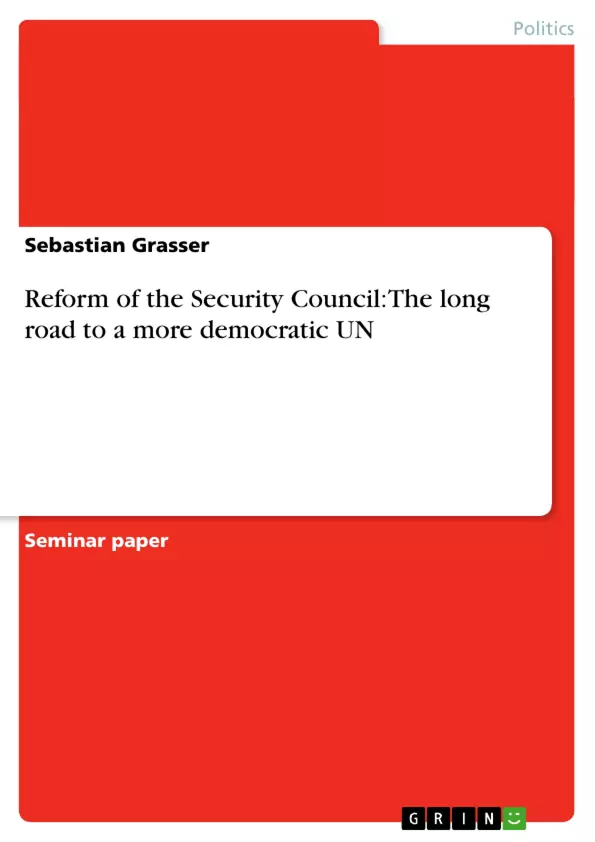This paper deals with the question why a reform of the Security Council is overdue, which types of future faces of the council could be possible and why the Security Council undercuts all attempts of reform. Do the members of the Security Council really serve national interests by trying to maintain their power in the current Security Council and by blocking every reform attempt? Or has the time for a reform not come yet?
The first section will include the failed G4 reform bill and an explanation of the main problems of the Security Council. Section two will explore previous reform attempts and section three will show possible and current reform proposals. Finally, section four contains a conclusion to this topic.
Inhaltsverzeichnis (Table of Contents)
- The Security Council and its rejection of the G4 UN reform bill
- The G4 UN reform bill and the present pursuit of a reform of the Security Council
- Functions of the Security Council
- Veto and main problems of the Security Council
- Previous reform attempts and initiatives
- Present Reform Initiatives and Proposals
- The Grand Bargain of a 23 member Council
- A total democratization of the Council
- Weighted voting reform
- Extension of the veto powers to other member states
- Critical reflection on proposed reform initiatives
- Conclusion: a long road to a more democratic Security Council – the survival instinct of the member states of the council
Zielsetzung und Themenschwerpunkte (Objectives and Key Themes)
This paper explores the reasons behind the long-standing delay in reforming the UN Security Council, analyzing the dynamics that have led to its rejection of the G4 reform bill. It examines the various proposed reforms and their potential impact on the council's structure and functioning. The paper concludes by considering the implications of the council's resistance to change for its democratic legitimacy and effectiveness.
- The need for Security Council reform and its historical context
- The G4 reform bill and the challenges it faced
- The current power dynamics within the Security Council
- Potential future models for a reformed Security Council
- The implications of the council's resistance to change
Zusammenfassung der Kapitel (Chapter Summaries)
- The Security Council and its rejection of the G4 UN reform bill: This chapter introduces the G4 reform bill proposed by Germany, India, Brazil, and Japan, outlining its proposed changes to the Security Council. It discusses the reasons for the bill's rejection by the council, highlighting the ongoing tension between the current members and those seeking reform. The chapter also delves into the historical context of the Security Council's composition and its power dynamics.
- Functions of the Security Council: This chapter analyzes the primary functions of the Security Council, including its role in maintaining international peace and security, its authority to issue binding decisions, and the controversial use of the veto power.
- Previous reform attempts and initiatives: This chapter provides an overview of past reform attempts and initiatives, highlighting the challenges and obstacles encountered in previous efforts to change the council's structure and composition.
- Present Reform Initiatives and Proposals: This chapter explores various current reform proposals, including the “Grand Bargain” approach, a complete democratization model, and proposals for weighted voting and expanding the veto power. It analyzes the strengths and weaknesses of each proposal and their potential impact on the council's dynamics.
Schlüsselwörter (Keywords)
This paper focuses on the reform of the UN Security Council, examining the G4 reform bill, the veto power, and the current power dynamics within the council. It explores various reform proposals and their implications for the council's structure, composition, and democratic legitimacy. The paper delves into the historical context of the Security Council, its functions, and its role in maintaining international peace and security.
Frequently Asked Questions
What is the "G4" reform bill in the UN?
The G4 (Germany, India, Brazil, and Japan) proposed a reform bill to expand the Security Council with more permanent and non-permanent members to better reflect today's world.
What are the main problems of the current Security Council?
The main issues include the outdated composition from 1945, the controversial veto power of the five permanent members, and a lack of democratic legitimacy.
Why are reform attempts often blocked?
Current permanent members often prioritize national interests and power maintenance, using their influence to block changes that might dilute their authority.
What is the "Grand Bargain" proposal?
It is a reform initiative suggesting a Council of 23 members to increase representation while trying to find a compromise acceptable to the current major powers.
What are other models for a reformed Security Council?
Other models include weighted voting systems, a total democratization of the Council, or the extension of veto powers to new permanent members.
- Citar trabajo
- Sebastian Grasser (Autor), 2006, Reform of the Security Council: The long road to a more democratic UN, Múnich, GRIN Verlag, https://www.grin.com/document/76785



